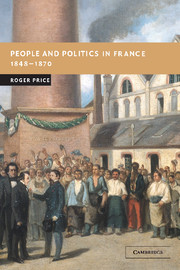Book contents
- Frontmatter
- Contents
- Acknowledgements
- List of abbreviations
- Introduction
- 1 Dominant classes: the social elites
- 2 Coming to terms with ‘democracy’
- 3 Aspiring social groups: the middle classes
- 4 Peasants and rural society: a dominated class?
- 5 Peasants and politics
- 6 The formation of a working class
- 7 The working-class challenge: socialisation and political choice
- Conclusion
- Select bibliography
- Index
6 - The formation of a working class
Published online by Cambridge University Press: 28 August 2009
- Frontmatter
- Contents
- Acknowledgements
- List of abbreviations
- Introduction
- 1 Dominant classes: the social elites
- 2 Coming to terms with ‘democracy’
- 3 Aspiring social groups: the middle classes
- 4 Peasants and rural society: a dominated class?
- 5 Peasants and politics
- 6 The formation of a working class
- 7 The working-class challenge: socialisation and political choice
- Conclusion
- Select bibliography
- Index
Summary
INTRODUCTION
As historians have come to question the use of ‘class’ as an analytical category, and to stress the danger of simplification implicit in the ‘reification’ of any analytical category, a vigorous debate has occurred concerning the viability of the concept of a ‘working class’. Jacques Rancière has gone so far as to suggest that the notion is simply a fictional construct created by romantically inclined and woolly minded intellectuals with a commitment to the under-privileged. Was the ‘working class’ nothing more than an illusion? Current orthodoxy would probably insist that social identity, the sense of belonging to a particular group, is the creation of a constant inter-relationship between discourse – the linguistic, cultural, and symbolic associations which establish an individual's sense of place and status – and experience – that of the day-to-day, of longer-term social change, and of political ‘events’. Discourse gives meaning to experience; experience constantly modifies discourse. Perceptions, rather than some objective reality, determine behaviour. As an alternative to class, historians have (re-)discovered the family and community – the basic units of socialisation, as well as a variety of cultural and political institutions, focusing on relationships which invariably cut across those of class. Gender and generation have additionally become topics of primary concern.
It might, nevertheless, be argued that family and community relationships and both gendered and generational experience were to a large degree class specific, and that class remains an analytical key vital to our understanding of social inequality and competition for power.
- Type
- Chapter
- Information
- People and Politics in France, 1848–1870 , pp. 274 - 356Publisher: Cambridge University PressPrint publication year: 2004



